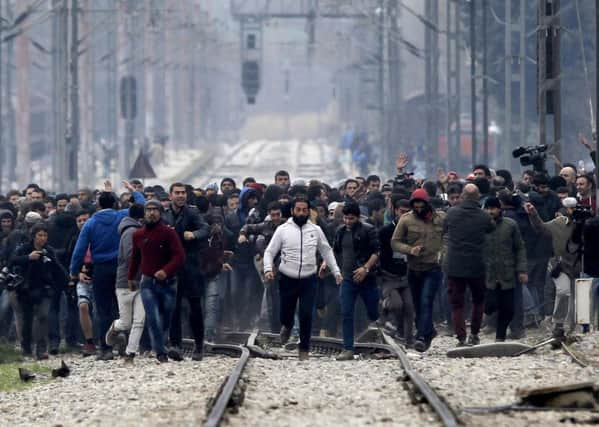Tempers flare as migrants make break into Greece across Macedonian border


Thousands of people have been stuck at Greece’s northern border, overflowing from a packed refugee camp at Idomeni into the surrounding fields as they wait for Macedonian authorities to let them continue their trek through the Balkans. Only a tiny trickle of people from specific countries have been allowed to cross every day.
The migrants had earlier pushed their way past Greek police to reach the gate, chanting “Open the border!” and “We want to go to Serbia!” the next country north on the Balkan migration route leading into Western Europe.
Advertisement
Hide AdAdvertisement
Hide AdPolice repelled the protesters and no arrests or injuries were reported in yesterday’s clashes.
About 6,500 Syrian and Iraqi refugees are camped at or near the Idomeni crossing, with another 500 moved to a hastily erected camp on a small concrete landing strip 13 miles away.
Macedonia has said it will only allow in as many people as Serbia accepts. This has led to a huge bottleneck in Greece, where authorities say more than 22,000 people are stuck and more are arriving every day.
Macedonian police opened the crossing to receive about 50 people just before midday yesterday but closed it again after the clashes. A police spokeswoman said a train with 450 refugees left the Greek border and was heading for Serbia.
Syrian refugee Nidal Jojack, 45, said she has been camped out with her family at Idomeni for three days and nights.
“Very many people were forced to sleep in the open, without tents, wrapped in blankets,” she said. “It was very cold. The borders are effectively closed, it’s a huge problem. To get food, we have to wait in very long queues.”
Jojack hopes to reach Germany, where her 18-year-old son has already arrived.
The Idomeni crossing is a key point on the mass migration route that has prompted a major Europe-wide crisis. More than a million people have entered the continent since January 2015 - mostly arriving in small smugglers’ boats from Turkey on Greece’s eastern Aegean Sea islands.
Advertisement
Hide AdAdvertisement
Hide AdAfter first sending welcoming messages, European authorities are now struggling to handle the situation. Hungary has fenced off its borders, refusing to accept any migrants, and other eastern European countries say they will not take in anyone under an EU refugee-sharing deal.
In recent weeks Austria - at the north end of the Balkan corridor - has severely restricted the inflow of migrants, causing a domino effect through the Balkans. Many countries are now refusing to let Afghan refugees in, although UN authorities say no one has explained to them who made this decision or why.
Diplomatic tensions are rising too, with criticism mounting against Austria, while Athens has threatened to block decisions at an upcoming EU-Turkey summit unless the bloc forces members to shoulder a proportionate share of the refugee burden.
German Chancellor Angela Merkel, meanwhile, issued a robust defense of her quest for a European solution to the migrant crisis. Merkel is resisting calls at home and elsewhere in Europe for limits on refugees like Austria has introduced.
“We can’t do this in such a way that we simply abandon Greece,” she said.